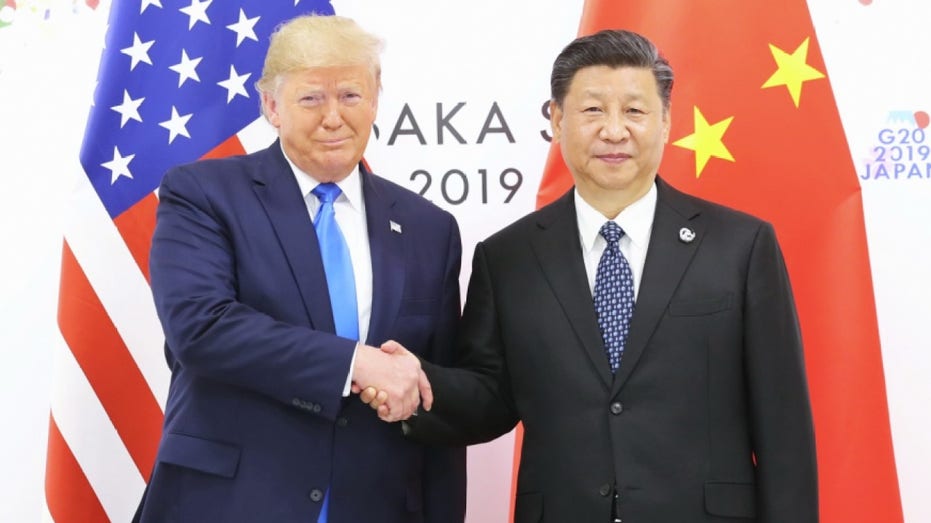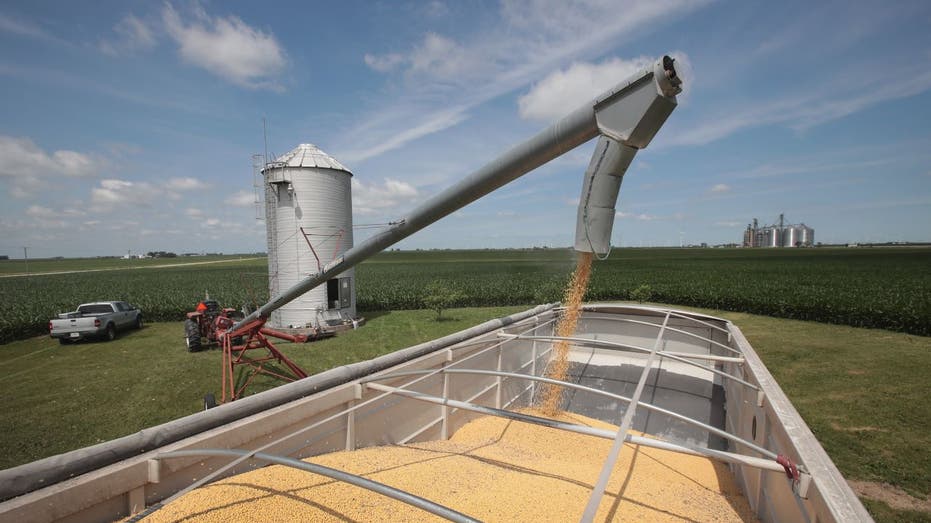Trump and Xi strike trade truce: 5 key takeaways from the South Korea summit
Trump, Xi met on the sidelines of the Asia-Pacific Economic Cooperation (APEC) summit in Busan
This is a testament to Trump’s ‘massive trade realignment,’ says agriculture secretary
U.S. Agriculture Secretary Brooke Rollins weighs in on the country’s trade with China and how the government shutdown is threatening SNAP funding on ‘Kudlow.’
President Donald Trump and Chinese President Xi Jinping reached an agreement on several trade matters that were driving their high-stakes trade dispute following their meeting in South Korea.
Trump and Xi met on the sidelines of the Asia-Pacific Economic Cooperation (APEC) summit in Busan on Thursday for what was their first in-person meeting since 2019, during Trump's first term.
Trump said that he reached a deal with China following what he told reporters aboard Air Force One was "an amazing meeting" that he rated "12 out of 10."
The president and Xi reached agreements on several areas that had been the source of friction in the ongoing trade dispute between the U.S. and China, which marked a step back from recent escalatory moves. Here's a look at some of the key aspects of the trade truce.

President Donald Trump and Chinese President Xi Jinping will meet in person for the first time since Trump's first term in office. ( Ju Peng/Xinhua via Getty)
AMERICAN SOYBEAN FARMERS FACE FINANCIAL CRISIS AS CHINA TRADE DISPUTE THREATENS LIVELIHOODS
Soybeans
Treasury Secretary Scott Bessent said on Thursday that China agreed to buy 12 million metric tons of U.S. soybeans in the current season and committed to buying 25 million tons annually over the next three years.
China halted purchases of U.S. soybeans earlier this year in retaliation for the Trump administration's tariffs on Chinese exports and instead pivoted to buying soybeans from South America.
The move cut off American farmers from the world's largest importer of soybeans, a market in which they were China's primary supplier of soybeans dating back to before Trump's first term. Soybean farmers are in a critical period for marketing their crop, and a failure to resolve the dispute would leave them struggling to find alternative buyers and taking a financial hit.
Ahead of the Trump-Xi meeting, Reuters reported that a Chinese state-owned firm moved forward with the first purchase of U.S. soybeans from China in months, though the two trade sources told the outlet they don't expect a significant rise in demand for U.S. soybeans after China's purchases from South America.

China halted purchases of U.S. soybeans earlier this year, though it has reportedly allowed some purchases to go forward in advance of the Trump-Xi meeting. (Scott Olson/Getty Images)
TRUMP, AUSTRALIA PM SIGN $8.5B CRITICAL MINERALS DELA TO COUNTER CHINA DOMINANCE IN RARE EARTHS
Fentanyl
Trump said following his meeting with Xi that China's efforts to crack down on the trafficking of fentanyl precursors have been sufficient to lower tariffs on Chinese goods.
The president imposed 20% tariffs on China over fentanyl earlier this year and also imposed them on Canada and Mexico, arguing the precursor chemicals are shipped through those countries.
After meeting with Xi, Trump said he's slashing the 20% fentanyl tariffs on China in half, which will reduce overall tariffs on Chinese goods from 57% to 47%.
CHINA RESPONDS TO US-AUSTRALIA RARE EARTHS DEAL
Rare earths
The Chinese government recently moved to implement tougher export controls on rare earth minerals, which are used in a variety of high-tech applications, ranging from smartphones and electric vehicle batteries to military radars and cruise missiles.
Xi, in an effort to smooth over trade tensions, agreed to pause China's export controls on rare earths for one year following the meeting with Trump in South Korea.
China is the world's leading producer of rare earths and has the largest reserves, according to a report by the U.S. Geological Survey (USGS). The USGS found that, in 2024, China's mines produced 270,000 tons of rare earths, and the country has 44 million tons of reserves. By comparison, the U.S. produced 45,000 tons and had 1.9 million tons of reserves last year, while Australia produced 13,000 tons and had 5.7 million tons of reserves.
The U.S. and Australia recently announced an agreement to cooperate on developing rare earths in response to China's move. The two governments agreed to each invest $1 billion in mining and processing projects in the next six months and to cut permits for mines, processing facilities and related operations.
OIL PRICES SURGE AS TRUMP HITS RUSSIAN ENERGY GIANTS WITH SWEEPING NEW SANCTIONS

China and India are rethinking Russian oil purchases after the U.S. sanctioned Russian energy companies over their role in funding the war in Ukraine. (Hussein Faleh/AFP via Getty Images)
Russian oil and energy
Last week, the Trump administration imposed new sanctions on Russian oil companies over their role in funding Russia's war in Ukraine, which has become the biggest land war in Europe since World War II.
The sanctions, aimed mainly at China and India as key energy clients of Russia, give companies until Nov. 1 to cut their transactions with Russian oil producers or face losing access to the Western banking system.
Major Chinese state oil companies, including PetroChina, Sinopec, CNOOC and Zhenhua Oil moved to halt purchases of Russian seaborne oil, at least temporarily, in response to the sanctions.
TRUMP SIGNS EXECUTIVE ORDER ALLOWING TIKTOK DEAL TO PROCEED

Trump approved a deal allowing TikTok's acquisition that he is looking to finalize with China. (AaronP/Bauer-Griffin/GC Images)
TikTok
Trump said he may be able to sign a final deal with Xi that allows TikTok, the short-form video platform owned by Chinese company ByteDance, to separate its U.S. operations from ByteDance in a transaction valued around $14 billion.
The president signed an executive order late last month to allow the deal to proceed, though the U.S. and Chinese governments hadn't finalized the agreement that would allow the transaction to proceed.
Bessent said Thursday that he expects the deal to move forward in the coming weeks and months, telling FOX Business Network that the U.S. secured China's approval for the deal during meetings in Kuala Lumpur. China's Commerce Ministry said earlier on Thursday that it wil properly handle TikTok-related issues.
GET FOX BUSINESS ON THE GO BY CLICKING HERE
Last year, Congress enacted a law that banned TikTok and other apps, which are subject to the control of adversarial foreign governments like China's, over concerns about data security and the use of the platforms' algorithms for foreign influence operations. It allowed for them to be divested from foreign ownership to remain available to U.S. users.
The law took effect Jan. 19, 2025, after it survived a Supreme Court challenge and allowed a 90-day extension, though the president signed multiple 75-day extensions to conclude the deal.
Reuters contributed to this report.




















